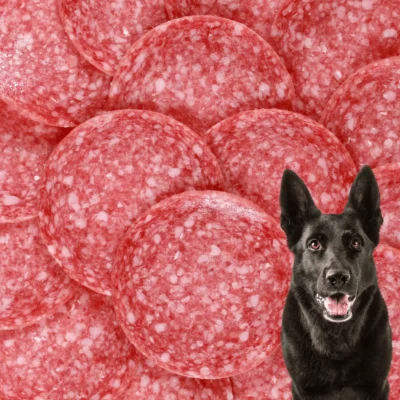As pet parents, you’ve likely seen others on social media sharing images of dogs munching on raw bones and organ meats, such as chicken hearts. You might be curious if your pup should also indulge in it. Well, the answer is yes! Including organ meats, like chicken hearts, in your dog’s diet can be a game-changer for their health. These vital organs are packed with essential vitamins and nutrients that can bolster the immune system, support heart and blood health, and more.
In this article, we delve into whether dogs can eat chicken hearts. We will discuss the health advantages of feeding chicken hearts to dogs. We will explore the proper methods of cooking, determine the appropriate quantity for optimal health, and identify reliable sources for obtaining these nutritious organ meats.
Here are the topics we’re going to discuss in this blog post:
- What are chicken hearts?
- Are chicken hearts safe for dogs?
- Where can you buy chicken hearts for dogs?
- Health advantages of chicken hearts to dogs
- How do I cook chicken hearts for dogs?
- How many chicken hearts can a dog eat?
- How to store cooked chicken hearts
What are Chicken Hearts?

Chicken heart is just what it sounds like—the heart of a chicken. They are considered organ meats and are commonly consumed as food in various cultures around the world. These small, muscular organs are rich in nutrients, particularly protein, iron, zinc, and B vitamins.
From a nutritional standpoint, chicken hearts are a good source of high-quality protein, which is essential for muscle development and overall health. They also contain important vitamins and minerals that contribute to a balanced diet.
When people prepare it, they usually cook it thoroughly and add plenty of spices for flavor. Thankfully, chicken heart has a pretty mild and agreeable taste compared to other strong-tasting organ meats, like beef heart. If you’re thinking about incorporating it into your or your pet’s diet, it might be a tastier option than you’d expect!
Are Chicken Hearts Safe for Dogs?

Although dogs share a long history of domestication with wolves over many generations, which wolf do you think would settle for just chewing on the outside of the carcass? Chicken hearts might not be your go-to snack, but for dogs, they’re a culinary delight. Chicken hearts are generally safe for dogs when prepared and fed appropriately.
The benefits of chicken hearts for dogs are quite impressive. Freeze-dried chicken hearts are loaded with vitamin A, iron, and various B vitamins. And that’s not all—they’re an excellent source of taurine, a sulfamic acid, and a crucial component of protein. So, even if faint-of-hearts aren’t making it to your dinner plate, they can certainly be a tasty and nutritious addition to your pup’s diet!
Animal hearts, especially from chicken and turkey, offer a lean source of protein along with essential fatty acids. Both cooked and raw chicken hearts are beneficial for your canine companion. Many veterinarians advocate for the raw form, considering it to be more natural and advantageous for dogs.
Where Can You Buy Chicken Hearts for Dogs?
For the freshest chicken hearts, head to your local farm. If you’re aiming for top-notch quality, consider grabbing organic chicken hearts from places like Whole Foods or other grocery stores, such as Kroger. You’ll find that many grocery stores stock packs of chicken hearts and gizzards that you can easily incorporate into your pet’s diet. Choosing locally sourced and organic options ensures a higher quality of meat for your furry friend.
Health Advantages of Chicken Hearts for Dogs:

Chicken hearts can offer several health perks for dogs when included as part of a balanced and well-managed diet. Here are many of the potential health benefits:
1. Great Source of Protein:
Chicken hearts are a fantastic source of high-quality protein, which plays a crucial role in supporting various aspects of your dog’s health. Protein is necessary for muscle development, repair, and overall body function.
It helps maintain a healthy weight and promotes the development of lean muscle mass, contributing to your furry friend’s overall well-being. So, incorporating chicken hearts into your dog’s diet can be a tasty and nutritious way to ensure they get the protein they need!
2. Vitamins and Minerals:
Chicken hearts provide dogs with a range of essential vitamins and minerals, such as B vitamins, iron, zinc, phosphorus, copper, and niacin. B12 is vital for neurological function and the formation of red blood cells. It helps in the maintenance of a healthy nervous system.
B6 supports protein metabolism, immune function, and the formation of red blood cells. Iron is an important component of hemoglobin, the protein in red blood cells responsible for carrying oxygen throughout the body.
Zinc takes part in maintaining a healthy immune system. It supports the function of immune cells and aids in wound healing. Niacin is essential for cellular function and DNA repair. It supports the digestive system and plays a role in maintaining healthy skin.
3. Taurine Content:
Taurine is an amino acid that plays a crucial role in maintaining a healthy cardiovascular system. It helps regulate the heartbeat and supports the proper functioning of the heart muscle.
Taurine is crucial for eye health, and its deficiency can lead to vision issues. Including taurine-rich foods in a dog’s diet, such as chicken hearts, may contribute to maintaining optimal vision.
4. Low in Fat:
Dogs that need to manage their weight or are prone to obesity can benefit from treats with a lower fat content. Chicken hearts, being relatively low in fat, provide a flavorful option for treats without contributing excessively to caloric intake.
High-fat diets are associated with an increased risk of pancreatitis in dogs. By offering treats with a lower fat content, such as chicken hearts, pet owners may help reduce the risk of pancreatitis, a condition characterized by pancreatic inflammation.
5. Easy to Digest:
Chicken hearts are a type of muscle meat, and muscle tissues are generally easier to digest compared to some other parts of the animal, such as bones or tough connective tissues.
Chicken hearts are generally easy for dogs to digest, making them a suitable option for dogs with sensitive stomachs or digestive issues. The natural composition of organ meats, like chicken hearts, can be gentler on a dog’s digestive system than certain processed treats.
How do You Cook Chicken Hearts for Dogs?

To offer you more options, here are four simple ways to prepare chicken hearts for your dog. You can choose to boil them, air fry them, bake them, or dehydrate them.
Regardless of the method you choose, start by thoroughly rinsing the hearts and trimming them if necessary. This ensures you’re providing your pup with a clean and well-prepared treat. Now, let’s explore these easy and varied ways to prepare chicken hearts for your furry friend.
1. Boiled Chicken Hearts for Dogs:
- Place the chicken hearts in a pan and cover with water.
- Bring it to a boil, then lower the heat and let it simmer for about 15 to 20 minutes.
- After simmering, drain the hearts, but don’t forget to save the nutrient-rich broth!
2. Air Fryer Chicken Hearts for Dogs:
- To ensure the chicken hearts don’t stick, coat the air fryer basket with oil.
- Air fry at 350°F for about 8 minutes or until they reach an internal temperature of 165°F.
- Halfway through the air frying process, give the hearts a flip in the basket by shaking it or using a spatula or spoon.
3. Baked Chicken Hearts for Dogs:
- Lay down some parchment paper on a baking sheet to get started.
- Lay out the chicken hearts in a single layer on the prepared baking sheet.
- Pop them in the oven at 400°F for 10 to 15 minutes, or until the internal temperature hits 165°F.
4. Dehydrated Chicken Hearts for Dogs:
- Arrange chicken hearts on a dehydrator tray.
- Set the dehydrator to 165°F and let them dehydrate for 12 to 16 hours, or until all moisture is removed.
Remember, regardless of the cooking method, ensure the hearts cool to room temperature before treating your dog. This thoughtful step ensures a safe and enjoyable snack for your furry companion.
How Many Chicken Hearts Can a Dog Eat?

When determining the appropriate amount of chicken hearts for your dog, it’s crucial to consider various factors, such as their overall diet, size, and activity level. Smaller dogs typically require fewer calories than larger ones, so tailoring the portion to your dog’s specific needs ensures they receive the right balance of nutrition for their size and activity level.
Since hearts are organ meat, it’s essential to offer them in moderation, similar to other organs like the liver and kidneys. For an active dog, approximately 10% of organ meat in the diet is generally acceptable. If your pet is exceptionally active, they might tolerate up to 15%. However, for dogs dealing with weight issues, it’s advisable to limit the intake to less than 10%. Balancing the quantity of organic meat contributes to a healthy and well-rounded diet for your furry friend.
How to Store Cooked Chicken Hearts:
Here’s a handy guide for storing chicken hearts prepared through different methods:
1. Boiled, Baked, and Air-fried:
Store the prepared and cooled chicken hearts in the refrigerator in an airtight container. They can remain fresh for up to four days. For longer storage, freeze them in a freezer-safe container or plastic freezer bag for up to 4 months. Remember to thaw them in the fridge overnight before serving.
2. Dehydrated:
Keep the cooled, dehydrated hearts in an airtight container at room temperature, and store them in a cool, dry place. If thoroughly dried, they can remain fresh for up to 6 months. Be cautious about moisture, as it can shorten the shelf life. Periodically check for any signs of mold or spoilage and discard if needed.
Conclusion:
In conclusion, incorporating chicken hearts into your dog’s diet can offer a myriad of health benefits. These organ meats are not only a great source of high-quality protein but also provide essential vitamins and minerals crucial for various aspects of your canine companion’s well-being. From supporting muscle development to promoting a healthy cardiovascular system, chicken hearts stand out as a nutritious and flavorful treat.
Whether you choose to boil, air fry, bake, or dehydrate them, preparing faint hearts for your dog can be a simple and enjoyable process. It’s essential to consider factors such as your dog’s size, activity level, and overall diet when determining the appropriate quantity to ensure a well-balanced nutritional intake.
When sourcing chicken hearts, opting for fresh, locally sourced, and organic options ensures a higher quality of meat for your furry friend. Local farms and reputable grocery stores can be excellent places to find these nutritious organ meats.
Remember to store cooked chicken hearts appropriately, whether boiled, baked, air-fried, or dehydrated, to maintain their freshness and nutritional value. By following these guidelines, you can treat your dog to a tasty and health-boosting snack that aligns with their dietary needs.
FAQs:
Q: Are chicken hearts safe for dogs to eat?
Yes, chicken hearts are generally safe for dogs when served in moderation. They are a good source of essential nutrients like protein, iron, and zinc. However, it’s crucial to remove any bones before feeding them to your dog to prevent choking or digestive issues.
Q: How should chicken hearts be prepared for dogs?
Chicken hearts should be cooked thoroughly to eliminate any potential bacteria or parasites. Boiling or baking are common methods. Avoid using seasonings, additives, or excessive oils, as these can be harmful to dogs.
Q: Can I feed raw chicken hearts to my dog?
While some people choose to feed their dogs a raw diet, it’s important to note that raw meat carries a risk of bacterial contamination. Consult with your veterinarian before introducing raw food into your dog’s diet to ensure it’s safe and nutritionally balanced.
Q: Can chicken hearts help with dental health?
Chewing on chicken hearts may help promote dental health by reducing plaque and tartar. However, ensuring the hearts are appropriately sized to prevent choking is essential. Regular dental care, such as brushing, is still recommended for optimal oral hygiene.
Q: Can chicken hearts replace regular dog food?
No, chicken hearts should not replace complete and balanced dog food. They can be included as a tasty and nutritious treat, but your dog’s main diet should consist of well-formulated commercial dog food that meets their nutritional requirements.
Q:Can chicken hearts cause allergies in dogs?
Yes, some dogs may have allergies or sensitivities to poultry. It’s essential to monitor your dog for any signs of allergic reactions, such as itching, redness, or digestive upset, and consult with your veterinarian if you observe any concerning symptoms.












